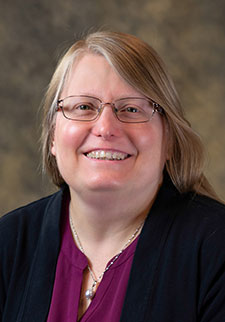Pennsylvania College of Technology faculty detailed for nationwide peers an ongoing initiative to address the critical shortage of cybersecurity professionals.
Jacob R. Miller and Sandra Gorka, associate professors of computer science, presented “Improving the Pipeline” at the Colloquium for Information Systems Security Education in Las Vegas. Their talk summarized a paper they wrote with Alicia McNett, instructor of computer information technology, and Bradley M. Webb, assistant dean of industrial, computing and engineering technologies.
The annual colloquium brings together educators, business and industry leaders, and practitioners to share ideas, research and needs related to cybersecurity.

 Gorka and Miller described an estimated cybersecurity job shortage of 2.9 million worldwide and 498,000 in the United States, and how the program they developed through a $438,391 National Science Foundation grant has introduced such careers to high school students.
Gorka and Miller described an estimated cybersecurity job shortage of 2.9 million worldwide and 498,000 in the United States, and how the program they developed through a $438,391 National Science Foundation grant has introduced such careers to high school students.
The duo, with assistance from McNett, created a college credit introductory information assurance and cybersecurity class for local high school juniors and seniors.
During the past two academic years, 40 high school students took the course.
Miller and Gorka reported that some of those students showed an interest in cybersecurity careers as a result of the class, but more indicated that the “cyber-safe” message inherent in the material would serve them well in other disciplines. In response, the college has revised the course, so the information is presented more in the context of general security for individuals and the systems they work with and less on programming and networking technical material desired by IT/security majors.
“The revised course helps ensure that students will become employees who are security aware,” Miller said. “Presumably, some non-IT students may take the class and decide to change their career direction to cybersecurity. We think the revised class will appeal to a much broader audience.”
The course, Cybersecurity for Non-IT Majors, is available for any Penn College student.
It remains open for high school juniors and seniors in Lycoming, Clinton, Bradford, Sullivan and Tioga counties. Accepted students receive a scholarship to cover the cost of the class.
High school teachers are also eligible to take the course and teach it as part of Penn College NOW, the college’s nationally accredited dual-enrollment program.
Teachers and high school students can visit the Cybercorps webpage to apply for the program for Spring 2020.
“With the NSF grant, Sandra and Jake have led the way for the college in addressing cybersecurity educational issues for the students of today and tomorrow,” Webb said. “They have been tireless in sharing their resources and findings with fellow educators throughout the country. Writing a paper and presenting at CISSE is just the latest example of their dedication.”
Penn College offers baccalaureate degrees in information assurance and cyber security, game and simulation programming, information technology: network specialist concentration, and software development and information management, and an associate degree in information technology: technical support technology emphasis.
Information about those majors and other programs from the School of Industrial, Computing & Engineering Technologies is available by calling 570-327-4520.
Penn College is a national leader in applied technology education. Email the Admissions Office or call toll-free 800-367-9222.
Jacob R. Miller and Sandra Gorka, associate professors of computer science, presented “Improving the Pipeline” at the Colloquium for Information Systems Security Education in Las Vegas. Their talk summarized a paper they wrote with Alicia McNett, instructor of computer information technology, and Bradley M. Webb, assistant dean of industrial, computing and engineering technologies.
The annual colloquium brings together educators, business and industry leaders, and practitioners to share ideas, research and needs related to cybersecurity.

 Gorka and Miller described an estimated cybersecurity job shortage of 2.9 million worldwide and 498,000 in the United States, and how the program they developed through a $438,391 National Science Foundation grant has introduced such careers to high school students.
Gorka and Miller described an estimated cybersecurity job shortage of 2.9 million worldwide and 498,000 in the United States, and how the program they developed through a $438,391 National Science Foundation grant has introduced such careers to high school students.The duo, with assistance from McNett, created a college credit introductory information assurance and cybersecurity class for local high school juniors and seniors.
During the past two academic years, 40 high school students took the course.
Miller and Gorka reported that some of those students showed an interest in cybersecurity careers as a result of the class, but more indicated that the “cyber-safe” message inherent in the material would serve them well in other disciplines. In response, the college has revised the course, so the information is presented more in the context of general security for individuals and the systems they work with and less on programming and networking technical material desired by IT/security majors.
“The revised course helps ensure that students will become employees who are security aware,” Miller said. “Presumably, some non-IT students may take the class and decide to change their career direction to cybersecurity. We think the revised class will appeal to a much broader audience.”
The course, Cybersecurity for Non-IT Majors, is available for any Penn College student.
It remains open for high school juniors and seniors in Lycoming, Clinton, Bradford, Sullivan and Tioga counties. Accepted students receive a scholarship to cover the cost of the class.
High school teachers are also eligible to take the course and teach it as part of Penn College NOW, the college’s nationally accredited dual-enrollment program.
Teachers and high school students can visit the Cybercorps webpage to apply for the program for Spring 2020.
“With the NSF grant, Sandra and Jake have led the way for the college in addressing cybersecurity educational issues for the students of today and tomorrow,” Webb said. “They have been tireless in sharing their resources and findings with fellow educators throughout the country. Writing a paper and presenting at CISSE is just the latest example of their dedication.”
Penn College offers baccalaureate degrees in information assurance and cyber security, game and simulation programming, information technology: network specialist concentration, and software development and information management, and an associate degree in information technology: technical support technology emphasis.
Information about those majors and other programs from the School of Industrial, Computing & Engineering Technologies is available by calling 570-327-4520.
Penn College is a national leader in applied technology education. Email the Admissions Office or call toll-free 800-367-9222.
